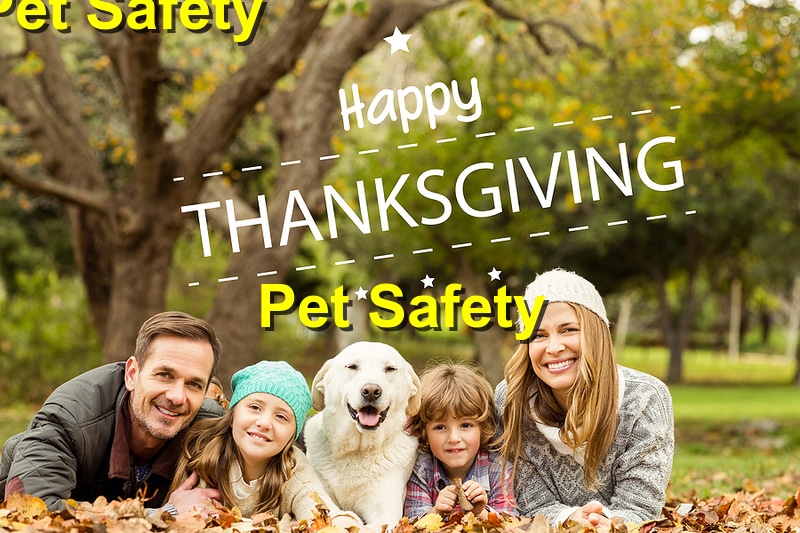Thanksgiving Pet Safety: How to Avoid Pet Emergencies at Dinner

Thanksgiving is a time for family, gratitude, and, of course, great food. But while we enjoy the holiday feast, our pets face hidden dangers that can quickly turn the celebration into a trip to the emergency vet. From tempting table scraps to crowded gatherings, it’s easy for pets to get into trouble if precautions aren’t taken.
Here’s how to keep your furry friends safe and healthy this Thanksgiving—so everyone can enjoy the day stress-free.
1. Keep Toxic Foods Off the Menu
Many Thanksgiving dishes contain ingredients that are harmful—or even deadly—to pets. While it’s tempting to share a bite from your plate, it’s best to stick to pet-safe treats instead.
Foods to avoid:
- Turkey bones and skin: Can cause choking or pancreatitis.
- Onions, garlic, and chives: Toxic to dogs and cats.
- Grapes and raisins: Can cause kidney failure.
- Chocolate, alcohol, and caffeine: Highly toxic to pets.
- Stuffing and casseroles: Often contain harmful spices or seasonings.
If you want your pet to feel included, prepare a small plate of plain, cooked turkey (no bones or seasoning) and some pet-friendly veggies like green beans or carrots.
2. Secure the Trash and Leftovers
The smell of Thanksgiving leftovers is irresistible to pets—but the trash can be one of the most dangerous places in the house. Bones, greasy packaging, and spoiled food can cause choking, poisoning, or gastrointestinal blockages.
Tips:
- Use a trash can with a secure lid.
- Dispose of food scraps immediately.
- Store leftovers safely out of reach.
If your pet manages to eat something questionable, contact your veterinarian or the ASPCA Animal Poison Control Center right away.
3. Manage Guests and Door Activity
Thanksgiving often brings visitors and excitement, but all that activity can stress pets or create escape risks. Guests may accidentally leave doors open or feed your pets unsafe foods.
Before guests arrive:
- Let visitors know your house rules about feeding pets.
- Keep an ID tag and microchip up to date.
- Consider setting up a quiet, comfortable space for your pet away from the noise.
Some pets do best with limited social interaction—so giving them their own room can help them feel safe and calm.
4. Decorate Safely
Festive decorations can also pose hazards. Candles, table centerpieces, and even seasonal plants can cause harm if pets get curious.
Watch out for:
- Lit candles: Keep them out of reach to prevent burns or fires.
- Plants like poinsettias and lilies: Toxic to cats and dogs.
- Strings, ribbons, or tinsel: Can cause intestinal blockages if swallowed.
Keep decorations simple and secure to minimize risks.
5. Watch for Stress and Overstimulation
Loud noises, new faces, and strong food smells can overwhelm pets. Dogs may bark excessively, while cats might hide or become agitated.
To reduce stress:
- Stick to your pet’s usual feeding and walking schedule.
- Provide toys or puzzle feeders to keep them occupied.
- Play calming music or use a pheromone diffuser.
A little structure helps your pet feel more relaxed in the midst of holiday chaos.
6. Have Emergency Numbers Ready
Even with the best preparation, accidents can happen. Keep contact info for your veterinarian and the nearest 24-hour emergency animal clinic somewhere visible. If you suspect poisoning, call the ASPCA Animal Poison Control Center (1-888-426-4435) immediately.
Quick action can save your pet’s life in case of an emergency.
Conclusion
Thanksgiving is a time for joy and togetherness—but keeping your pets safe should be part of your holiday plan. By watching what they eat, securing the trash, managing guests, and being mindful of decorations, you can prevent common emergencies and keep your pets happy and healthy.
A little preparation goes a long way in making sure your furry family members enjoy the day as much as you do—without an unexpected trip to the vet.
References: Waggle
Comments
Post a Comment